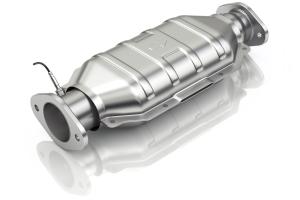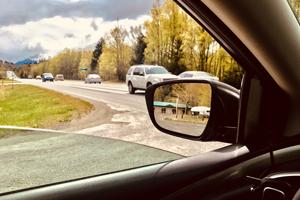Don’t ask for trouble — always signal!
Ask professional drivers to identify major driver errors, chances are they will indicate, “too many fail to signal.” Ask any police officer the phrase heard most often when investigating traffic accidents and the comment “the other driver didn’t signal,” will often be at the top of the list.
Clear, understandable signaling between drivers is absolutely essential on today’s high-speed expressways and congested streets. Otherwise, we would have complete mayhem on our roads.
As a professional driver, you have a responsibility not to allow yourself to be classified with bad mannered and foolish drivers. Instead, you should set an example for every other driver to follow.
Keep your signaling habits sharp
Here’s a quick review of the methods you have for communicating with other drivers:
Horn — Use in daytime passing situations to communicate with the driver being passed. Also for use in fog or inclement weather to notify others of your presence.
Brake lights — By pumping your brakes you can warn a driver who is following too closely. The pumping procedure also can be used to warn a following driver well in advance that you are preparing to stop.
Turn signals — Use well in advance to indicate a change of lanes as well as warning others that you are turning. When changing lanes, use turn indicator, check rear view mirror, slow down and glance over the shoulder toward the lane change. When you see a motorist ahead, use signals and slow down until he or she has completed their maneuver.
Hand signals — Even with today’s automatic turn signals, there are times when you may be compelled to or when it is advisable to also use a hand signal. The hand signal can be beneficial to indicate a slowing down maneuver.
Conclusion
Communicating with other drivers is more than just extending courtesy. When you fail to signal properly you are failing your responsibility as a driver. The driver who fails to signal, and is rear ended, will likely share a degree of responsibility for the accident.
Accidents are costly. Don’t ask for trouble by failing to signal.
This material is provided for informational purposes only and does not provide any coverage or guarantee loss prevention. The examples in this material are provided as hypothetical and for illustration purposes only. The Hanover Insurance Company and its affiliates and subsidiaries (“The Hanover”) specifically disclaim any warranty or representation that acceptance of any recommendations contained herein will make any premises, or operation safe or in compliance with any law or regulation. By providing this information to you, The Hanover does not assume (and specifically disclaims) any duty, undertaking or responsibility to you. The decision to accept or implement any recommendation(s) or advice contained in this material must be made by you.
LC NOV 2018 11-389
171-1133 (10/14)
Related resources
Don’t ask for trouble — always signal!
Ask professional drivers to identify major driver errors, chances are they will indicate, “too many fail to signal.” Ask any police officer the phrase heard most often when investigating traffic accidents and the comment “the other driver didn’t signal,” will often be at the top of the list.
Clear, understandable signaling between drivers is absolutely essential on today’s high-speed expressways and congested streets. Otherwise, we would have complete mayhem on our roads.
As a professional driver, you have a responsibility not to allow yourself to be classified with bad mannered and foolish drivers. Instead, you should set an example for every other driver to follow.
Keep your signaling habits sharp
Here’s a quick review of the methods you have for communicating with other drivers:
Horn — Use in daytime passing situations to communicate with the driver being passed. Also for use in fog or inclement weather to notify others of your presence.
Brake lights — By pumping your brakes you can warn a driver who is following too closely. The pumping procedure also can be used to warn a following driver well in advance that you are preparing to stop.
Turn signals — Use well in advance to indicate a change of lanes as well as warning others that you are turning. When changing lanes, use turn indicator, check rear view mirror, slow down and glance over the shoulder toward the lane change. When you see a motorist ahead, use signals and slow down until he or she has completed their maneuver.
Hand signals — Even with today’s automatic turn signals, there are times when you may be compelled to or when it is advisable to also use a hand signal. The hand signal can be beneficial to indicate a slowing down maneuver.
Conclusion
Communicating with other drivers is more than just extending courtesy. When you fail to signal properly you are failing your responsibility as a driver. The driver who fails to signal, and is rear ended, will likely share a degree of responsibility for the accident.
Accidents are costly. Don’t ask for trouble by failing to signal.
This material is provided for informational purposes only and does not provide any coverage or guarantee loss prevention. The examples in this material are provided as hypothetical and for illustration purposes only. The Hanover Insurance Company and its affiliates and subsidiaries (“The Hanover”) specifically disclaim any warranty or representation that acceptance of any recommendations contained herein will make any premises, or operation safe or in compliance with any law or regulation. By providing this information to you, The Hanover does not assume (and specifically disclaims) any duty, undertaking or responsibility to you. The decision to accept or implement any recommendation(s) or advice contained in this material must be made by you.
LC NOV 2018 11-389
171-1133 (10/14)
Related resources
Don’t ask for trouble — always signal!
Ask professional drivers to identify major driver errors, chances are they will indicate, “too many fail to signal.” Ask any police officer the phrase heard most often when investigating traffic accidents and the comment “the other driver didn’t signal,” will often be at the top of the list.
Clear, understandable signaling between drivers is absolutely essential on today’s high-speed expressways and congested streets. Otherwise, we would have complete mayhem on our roads.
As a professional driver, you have a responsibility not to allow yourself to be classified with bad mannered and foolish drivers. Instead, you should set an example for every other driver to follow.
Keep your signaling habits sharp
Here’s a quick review of the methods you have for communicating with other drivers:
Horn — Use in daytime passing situations to communicate with the driver being passed. Also for use in fog or inclement weather to notify others of your presence.
Brake lights — By pumping your brakes you can warn a driver who is following too closely. The pumping procedure also can be used to warn a following driver well in advance that you are preparing to stop.
Turn signals — Use well in advance to indicate a change of lanes as well as warning others that you are turning. When changing lanes, use turn indicator, check rear view mirror, slow down and glance over the shoulder toward the lane change. When you see a motorist ahead, use signals and slow down until he or she has completed their maneuver.
Hand signals — Even with today’s automatic turn signals, there are times when you may be compelled to or when it is advisable to also use a hand signal. The hand signal can be beneficial to indicate a slowing down maneuver.
Conclusion
Communicating with other drivers is more than just extending courtesy. When you fail to signal properly you are failing your responsibility as a driver. The driver who fails to signal, and is rear ended, will likely share a degree of responsibility for the accident.
Accidents are costly. Don’t ask for trouble by failing to signal.
This material is provided for informational purposes only and does not provide any coverage or guarantee loss prevention. The examples in this material are provided as hypothetical and for illustration purposes only. The Hanover Insurance Company and its affiliates and subsidiaries (“The Hanover”) specifically disclaim any warranty or representation that acceptance of any recommendations contained herein will make any premises, or operation safe or in compliance with any law or regulation. By providing this information to you, The Hanover does not assume (and specifically disclaims) any duty, undertaking or responsibility to you. The decision to accept or implement any recommendation(s) or advice contained in this material must be made by you.
LC NOV 2018 11-389
171-1133 (10/14)
Related resources
Don’t ask for trouble — always signal!
Ask professional drivers to identify major driver errors, chances are they will indicate, “too many fail to signal.” Ask any police officer the phrase heard most often when investigating traffic accidents and the comment “the other driver didn’t signal,” will often be at the top of the list.
Clear, understandable signaling between drivers is absolutely essential on today’s high-speed expressways and congested streets. Otherwise, we would have complete mayhem on our roads.
As a professional driver, you have a responsibility not to allow yourself to be classified with bad mannered and foolish drivers. Instead, you should set an example for every other driver to follow.
Keep your signaling habits sharp
Here’s a quick review of the methods you have for communicating with other drivers:
Horn — Use in daytime passing situations to communicate with the driver being passed. Also for use in fog or inclement weather to notify others of your presence.
Brake lights — By pumping your brakes you can warn a driver who is following too closely. The pumping procedure also can be used to warn a following driver well in advance that you are preparing to stop.
Turn signals — Use well in advance to indicate a change of lanes as well as warning others that you are turning. When changing lanes, use turn indicator, check rear view mirror, slow down and glance over the shoulder toward the lane change. When you see a motorist ahead, use signals and slow down until he or she has completed their maneuver.
Hand signals — Even with today’s automatic turn signals, there are times when you may be compelled to or when it is advisable to also use a hand signal. The hand signal can be beneficial to indicate a slowing down maneuver.
Conclusion
Communicating with other drivers is more than just extending courtesy. When you fail to signal properly you are failing your responsibility as a driver. The driver who fails to signal, and is rear ended, will likely share a degree of responsibility for the accident.
Accidents are costly. Don’t ask for trouble by failing to signal.
This material is provided for informational purposes only and does not provide any coverage or guarantee loss prevention. The examples in this material are provided as hypothetical and for illustration purposes only. The Hanover Insurance Company and its affiliates and subsidiaries (“The Hanover”) specifically disclaim any warranty or representation that acceptance of any recommendations contained herein will make any premises, or operation safe or in compliance with any law or regulation. By providing this information to you, The Hanover does not assume (and specifically disclaims) any duty, undertaking or responsibility to you. The decision to accept or implement any recommendation(s) or advice contained in this material must be made by you.
LC NOV 2018 11-389
171-1133 (10/14)





